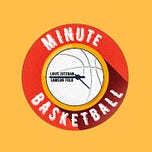How many times have you had to prove something that was already proven beyond the shadow of a reasonable doubt? It’s one of the most common reasons good employees hate bad employers, why confident lovers become frustrated with partners who lack the same certainty. Being forced to prove a fact that’s well known is what turned Wild West outlaws into mass murderers, as runaway youths challenged famous Kids like Billy or Sundance to prove their speed with a pistol, again and again.
That same force animates our relationship with NBA stars. Oh, you’re the best? Do it again. The arms race of legacy is a natural outgrowth of such spectacularity that we have trouble comprehending. LeBron James does things that no other human can do. The same for Zion Williamson. And Luka Doncic. And Steph Curry. And, well, you get my point. So how do we compare the incomparable?
By proving you’re the fastest and the deadliest gunslinger to ever wear spurs over and again until technology passes you by and the railway comes to town and cow wrangling doesn’t even make sense anymore. And then? Then winning another duel anyway.
We have to appreciate the uniqueness of NBA talent. Or else what’s the point? Still, the guys who can outduel the best are the best. That is legacy. In other words, if Clapton is God, what does that make Hendrix? This week in Minute Basketball: Legacy.
Folk - Parity, the Highway to Legacy
The polarizing talking points that have gotten more polarizing with time. #Rings culture and the evolution of conversation around basketball. The dwindling list of achievements that are even considered achievements anymore, and if someone does accomplish something then a host of people will almost assuredly try to undercut that year’s ‘something’ - as Louis points out down below. X wasn’t A, B wasn’t C. Is it corny that LeBron James meticulously crafts narratives for himself to overcome? Yes, absolutely it is. Do I blame him for that? No, not at all.
All of what I said up there is true. However (comma) it’s mostly contained in conversations with fans of other teams; arguments under Kendrick Perkins’ tweets, or the online soldiers of each fanbase, who, for whatever reason, argue their respective fanbases POV with anyone who would speak otherwise online.
Some people enjoy arguing and being combative, and for them I think that works quite well. I think most people like sharing things, though. Enthusiasm for players, a team, or basketball in general. That’s where most conversations are had, I think, between like minded people who celebrate the same things. Maybe even people who don’t celebrate your particular thing, but respect accomplishments that exist outside of their rooting interests.
A certain era of Toronto basketball is, to an average NBA fan, the LeBronto era. To Raptors fans, it was years of unbridled joy in a team that won a lot of games and employed extremely likeable stars. While the CP3+Harden Rockets were considered cannon fodder in the face of the Warriors to some, fans in Houston (and hopefully elsewhere) appreciate the team that repeatedly came the closest to knocking off what was maybe the greatest team of all time.
And that’s the super fun thing about parity. Some new and exciting teams will be able to advance further and exceed expectations. Crafting memories (the means in which many people become bonded to their sports team) for old fans and new ones. And they won’t have to punch up against worldbeaters to do it. The insular moments for that fanbase to enjoy amongst themselves.
“In many cases, although we agree what considerations are relevant to the comparison, it seems all we can say is that one alternative is better with respect to some considerations while the other is better in others, but it seems there is no truth about how they compare all things considered.” - Ruth Chang
The quote is only meant to illustrate this point: Julius Randle has an opportunity to perform in such a way that the city of New York will elevate him to legend status. And that status can’t be trod upon by LeBron James’ legendary performances in Los Angeles. Parity allows for a wider variety of outcomes, and legacies. It doesn’t have to be Randle or James either, and that’s the point.
I’ll be more minute in the coming weeks as we get playoff games to break down, but for this week I’m just happy to see parity and all its possibilities looming large in the NBA.
Let’s enjoy these playoffs.
Zatzman - Steph Curry
Steph Curry shaped the NBA in his image. Before Curry, the idea of the best shooter looked something like this.
Beautiful. But mostly static. It’s not that a guy like Ray Allen couldn’t do what Curry does. It’s that it never was an option. There was no space in the game for this as recently as 10 years ago.
But Curry didn’t just succeed by doing the impossible; he completely broke the game. Two MVPs, the winningest regular season in league history, three championships -- that’s the stuff of Larry Bird or Tim Duncan. Except Duncan didn’t have the league shooting bank shots after him. Bird didn’t have players doing … whatever the hell his signature move was (fancy passing? Just not missing ever? Hard to say). Curry has had one season of his whole career shooting below 40 percent on pull-up threes. Such shots have three qualities in common: they are ostensibly the hardest shots in the game, the most accessible, and for Curry, about the best shot an offense can take. He proved himself the fastest gun in the West (and the East) by outshooting all comers. And even though the NBA’s caught up, and his disciples are sometimes taking more threes than he, he’s still going to win the duel.
So what’s left for a player who recreated the entire world of basketball? Obviously, doing it all over again, but this time with a twist.
Curry was as inevitable as the tide for a period of several years. With the help of Draymond Green and Klay Thompson (and Kevin Durant), he made LeBron James an underdog. There’s gunslinging and then there’s that. Now Curry’s an underdog.
The wildest part of the whole performance is that Curry is better now than he ever was during his run as the NBA’s scrawniest Superman. He averaged 32 points a game this year, the most of his career, as efficient as he’s ever been, and without Durant or Thompson in tow to space the floor. Curry changed the league, and he’s still light years ahead.
There are multiple components of legacy. Curry has already defined modernity. That alone puts him in a class including Bill Russell, Elgin Baylor, Julius Irving, Michael Jordan, Shaq, LeBron James. Maybe a few others. But no one his size has ever defined the league like Curry. That’s legacy chiseled in stone, crusted with diamonds, and encased in a titanium vault; it can’t ever be taken away.
And yet -- and yet! -- Steph Curry lost to LeBron James and the wolf-in-sheep’s-clothing Los Angeles Lakers in the play-in game. Even if Curry beats the Memphis Grizzlies and makes the playoffs, the road to true playoff glory this year is more Sisyphean than ever before. He won’t win another championship, not this year. That doesn’t reduce him in the least. After all, there’s legacy and then there’s legacy.














Share this post